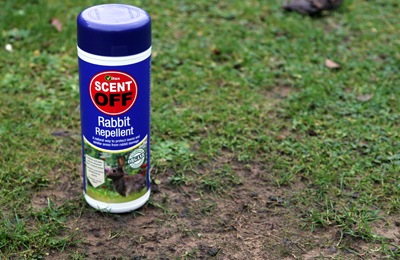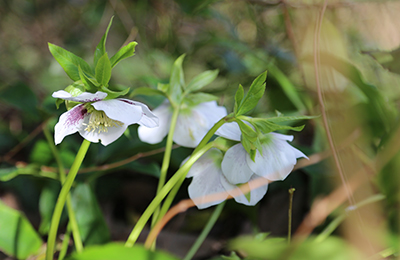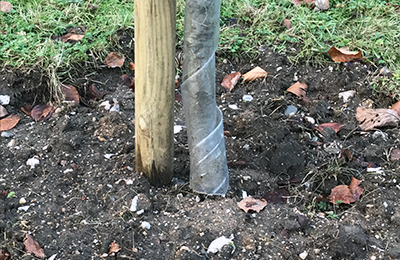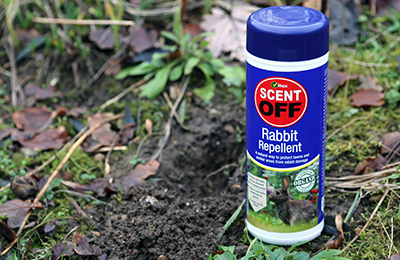How to keep rabbits at bay

As cute as they may be, rabbits are widespread garden pests that do a lot of damage in gardens. They scratch hollows in lawns and flower beds. They love tender young shoots and leaves and will happily strip the bark from young trees. They will gnaw through the twigs of young shrubs, their sharp teeth cutting off substantial stems to leave them lying on the ground. The damage they cause is often mistaken for that caused by deer; rabbits after all have an innocent appearance!
So what can you do to deter them? How can you protect your plants and lawn from damage?
Plant rabbit resistant plants
Rabbits each just about all vegetable plants with the possible exception of potatoes and onions. So if you want to grow vegetables you need to grow them behind a barrier, or raise them up away from harm.
 When it comes to ornamentals there are some plants that rabbits avoid: for example euphorbias, peonies, hellebores, foxgloves, daffodils and snowdrops. Aromatics such as lavender and rosemary may be avoided, but there are always those rabbit populations with different tastes! Likewise marigolds and onions (including ornamental alliums) are often recommended as growing deterrents, however some rabbits seem to love them.
When it comes to ornamentals there are some plants that rabbits avoid: for example euphorbias, peonies, hellebores, foxgloves, daffodils and snowdrops. Aromatics such as lavender and rosemary may be avoided, but there are always those rabbit populations with different tastes! Likewise marigolds and onions (including ornamental alliums) are often recommended as growing deterrents, however some rabbits seem to love them.
The best you can do is to try those plants which rabbits normally avoid and keep a close eye. A list is of rabbit resistant plants can be found on the Royal Horticultural Society’s website.
Keep them out with a physical barrier
If the rabbits live outside your garden you could surround your plot with rabbit fencing. This must be wire mesh, rabbits will chew through plastic mesh. The wire mesh needs to be at least 75cm (30ins) high, with another 15cm (6ins) buried below ground to prevent the creatures from burrowing and gaining access. A small mesh with holes 2.5cm (1ins) in diameter is ideal. This mesh can be fixed to existing fencing. The spaces under gates need careful attention.
In larger gardens vulnerable areas and new planting can be protected with similar barriers, even around individual plants. In this case the wire does not need to be buried, but it needs to be anchored to the ground to prevent access.
It is worth emphasising the newly planted subjects are the most vulnerable. Rabbits are curious creatures and will often have a go, if only to discover whether they want to eat it or not.
Protect young trees
Rabbits, with their sharp teeth, love to strip the bark from the base of young trees. This can cause irreparable damage and you need to protect with tree guards. The most popular ones are the flexible spiral plastic guards with wrap around the base of the trees. If gaps are left between the spirals at the base of a tree, be warned: a determined rabbit will chew off the bark where it is exposed, possibly causing the death of the tree. If necessary use two guards, one on top of the other, or push the spirals close together.
Use deterrents
There are various sprays and remedies that are often recommended to deter rabbits. Your chances of success with things like human hair, mothballs or garlic are remote. However Vitax Rabbit Repellent is an effective deterrent, especially around newly planted vulnerable crops. It is a natural product that emits an odour that rabbits associate with predator activity, so they avoid the area. The odour is not unpleasant for the user and the repellent is completely biodegradable, breaking down in the soil to release beneficial nitrogen.
It is best sprinkled straight from the pack as a continuous barrier around plants to be protected and should  remain effective for 6-8 weeks dependent on the amount of rainfall. The substance absorbs moisture and sticks to the ground, making if effective for longer than sprays and most other repellent powders.
remain effective for 6-8 weeks dependent on the amount of rainfall. The substance absorbs moisture and sticks to the ground, making if effective for longer than sprays and most other repellent powders.
Vitax Rabbit Repellent is perfect for use on lawns and in beds where rabbits do damage by scratching and shallow burrowing, especially in late winter and early spring.
Andy McIndoe for Vitax
Your login details have been used by another user or machine. Login details can only be used once at any one time so you have therefore automatically been logged out. Please contact your sites administrator if you believe this other user or machine has unauthorised access.













